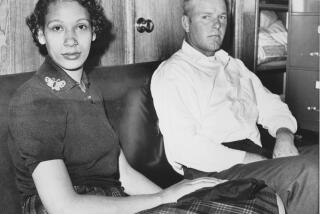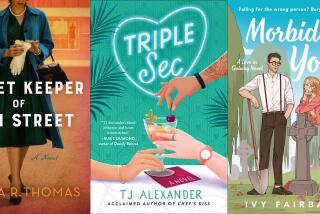Juggling life, love, dilemmas
- Share via
IN spates of B’s, Bertice Berry introduces the black Georgia women of her novel, “When Love Calls, You Better Answer”: the dead narrator Aunt Babe and Buster, who is Aunt Babe’s sister and negligent mother to Bernita Brown, their beloved victim who has fled them. Alliteration and poetry stop there as Aunt Babe weighs us down with explanations of her ghostly omniscience.
It could have been fun to watch the ghost of Aunt Babe pull strings in Bernita’s life; instead, we endure her folksy and plain-spoken language, and her continual bemoaning of their ancestors’ general impotence to have made a change.
With appealing frankness, Aunt Babe reveals the hate and abuse young Bernita took from her mother, grandfather and aunt. Bernita gets away to college, thanks to her high school principal and his wife, but after graduation she finds that her mother and Aunt Babe’s example leaves her attracted to all the wrong men. As a social worker at a shelter for battered women, Bernita is in just the emotional place to gravitate to less than honorable men. But it’s also at the shelter that she befriends the wise MaBisha, who advises Bernita with more immediacy than the whisperings of her spunky, watchful auntie ghost.
Nevertheless, Bernita marries an opportunist who turns out to be gay, then she runs into the arms of a brute. After she tires of his Neanderthal ways, she sleeps with the white leader of a pseudo-African cult until she discovers his philandering. Soon she falls under the spell of a married and predatory pastor, quitting her work with women to toil tirelessly in his church. If it weren’t for Aunt Babe’s otherworldly messages sent in her daily life and through receptive characters on the television shows Bernita watches, she might miss the dream man whose path she crosses several times. That this man goes from delivery driver to millionaire artist in the blink of an eye doesn’t seem plausible. In the end, with much sentimentality, Berry ties a neat blood ribbon around most of her characters, making them a big happy family. But in depicting such love for the sake of love, she gets away with it.
In Danyel Smith’s new novel “Bliss,” Eva Glenn is a highly paid, 34-year-old African American record executive attending a hip-hop and R&B; convention in the Bahamas in 1998. Eva has slept around without too much self-judgment but now that she is pregnant for the fourth time, she must decide whether she will keep this child instead of aborting it as she did the others. Compelled to choose between the two men with whom she has been involved for some time, she weighs their respective positions in the music galaxy. Bachelor No. 1, Dart, is brother and manager to Sunny, the Mariah Carey-meets-Tracy Chapman singer-songwriter whom Eva has made a star. Bachelor No. 2, Ron, is arrogant, white and president of black music at a major label.
When Eva and Ron converse tete-a-tete over the revelation that it is his child, race becomes even more of an issue between them. They still have hot sex, but it isn’t all that bad either, with manic-depressive Dart. So Eva escapes with Dart to Cat Island in search of voodoo and nuclear family fantasies, but there she realizes it won’t work.
Too often the author interrupts the action and dialogue with justifications. Though the narrative is ostensibly from Eva’s point of view, any other character’s take on Eva may butt in as well, such as these thoughts from a male colleague:
“[He] knew Eva’s strength was her weakness and her weakness her strength: She always felt like she was falling off, so she worked like a demon. Eva acted the student when it was wise, but calculated people’s motivations like a physics professor. She fired her looks like warning shots, used sex like tuition and a thermometer. But occasionally she surprised with wildly spontaneous moves.”
Awkward syntax is a rule in this novel. Bad writing doesn’t necessarily make a bad read, but Smith’s extraordinary amount of telling over showing makes it nearly impossible to discover who Eva is -- and still harder to care. *
More to Read
Sign up for our Book Club newsletter
Get the latest news, events and more from the Los Angeles Times Book Club, and help us get L.A. reading and talking.
You may occasionally receive promotional content from the Los Angeles Times.










